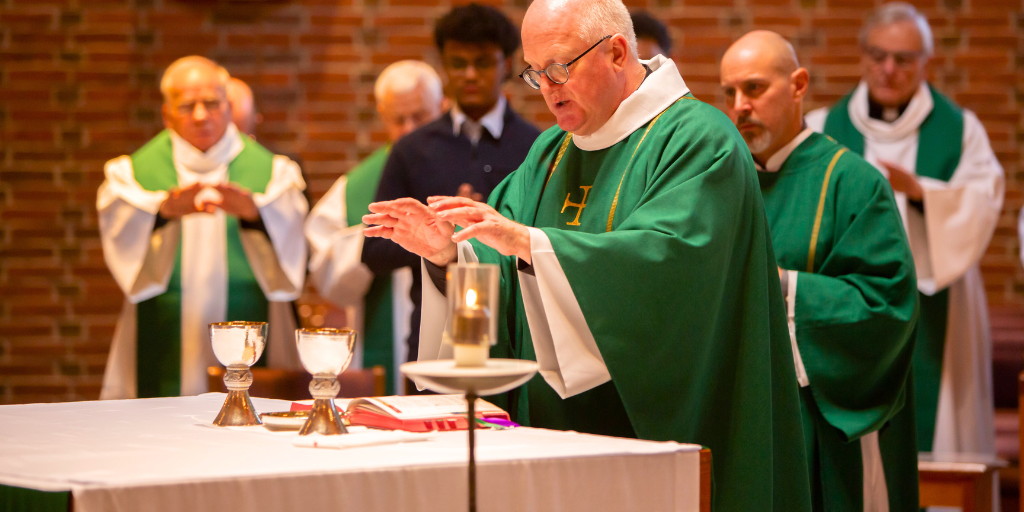
Jane Korvemaker ponders the need to recognize in our thoughts, words, and actions that all the baptized are part of the Body of Christ.
When I was very little, I was baptised into the Catholic Church by the consent of my mother and father. I was brought up accordingly, but faith was a thing that only largely affected (implicitly) morality, and there were few excuses valid to miss Sunday Mass. I didn’t notice it affecting much more than this while I was young.
The thing is, whether I knew it or not, whether I or my parents truly believed it or not, my Baptism changed me. In our Catholic belief, baptism alters the very essence of a person, it is a objective reality that we are ontologically changed. By entering into Christ’s death with him, I became irrevocably a member of His mystical, but very real, Body, eternally.
We highlight and recognise Christ is truly, really, and substantially present in the Eucharist, which is the fount and apex of our faith. This is absolutely true. And in the same breath we are to recognise that we, all the baptised, are an integral part of that Body. All of us. Even the ones who seem to know next to nothing, or are only seen at Christmas and Easter, or only pick and choose what they want to believe.

Body of Christ = All the Baptised?
I’m willing to bet that a number of those reading this might be thinking, "This isn’t what I thought the article was going to be about." If you’ve read this far with that presupposition, you’re not alone. If you’re questioning the importance of this connection, does it mean you’re not really Catholic, or that you’re just a buffet Catholic, picking what you like from what’s offered?
Not at all! It means that we all can grow more intimately in Christ.
The early Church took being baptised into Christ’s mystical Body as something absolutely central to our understanding of Eucharist. They are two sides of a coin, inseparably linked (see the Catechism, numbers 1396-1398). Our understanding of Christ in the Eucharist is lacking if we fail to also recognise Christ in His Body; one does not exist without the other: “For in one Spirit we were all baptized into one body” (1 Corinthians 12:13a).

Weak or Strong, All are Members
Saint Paul reminds us that there are those who may be in a different place in their faith than others, but they maintain the same dignity because Christ is still in each:
Indeed, the parts of the body that seem to be weaker are all the more necessary, and those parts of the body that we consider less honorable we surround with greater honor, and our less presentable parts are treated with greater propriety, whereas our more presentable parts do not need this. But God has so constructed the body as to give greater honor to a part that is without it, so that there may be no division in the body, but that the parts may have the same concern for one another. If [one] part suffers, all the parts suffer with it; if one part is honored, all the parts share its joy. (1 Corinthians 12:22-26)
If one part suffers, all suffer. How much more painful is it when it is a member of that very same body that attacks another member? We are the Body of Christ together and it is for His whole Body that Christ offered Himself as sacrifice on the cross, which we celebrate together:
The cup of blessing that we bless, is it not a participation in the blood of Christ? The bread that we break, is it not a participation in the body of Christ? Because the loaf of bread is one, we, though many, are one body, for we all partake of the one loaf. (1 Corinthians 10:16-17)

The Paschal Mystery in which we celebrate and partake in at Mass was entrusted by Christ to His “beloved spouse, the Church, [as] a memorial of His death and resurrection: a sacrament of love, a sign of unity, a bond of charity” (Sacrosanctum Concilium). God’s love, unity, and charity (that is, Christ), is consumed and assumed into each member by the Eucharist. It is the desire of God that Christ’s whole Body be brought into union with Him, “that they may all be one” (John 17:21).
Let us be mindful of the prayers at Mass which, in union with the priest who pleads to the Father, we too need to learn to desire with our hearts:
Humbly we pray
that, partaking of the Body and Blood of Christ,
we may be gathered into one by the Holy Spirit. (Eucharistic Prayer II)
Share your thoughts with the Catholic Mom community! You'll find the comment box below the author's bio and list of recommended articles.
Copyright 2024 Jane Korvemaker
Images: Holy Cross Family Ministries, all rights reserved.
About the Author

Jane Korvemaker
Jane Korvemaker loves food, family, wine, and God (perhaps not in that order). She holds a Certificate in Culinary Arts, which pairs perfectly with her Bachelor in Theology. A former Coordinator of Youth Ministry, she writes from the beautiful and cold province of Saskatchewan, Canada. She works from home and takes care of her three very hard-working children. Jane regularly blogs at AJK2.ca.


.png?width=1806&height=731&name=CatholicMom_hcfm_logo1_pos_871c_2728c%20(002).png)
Comments